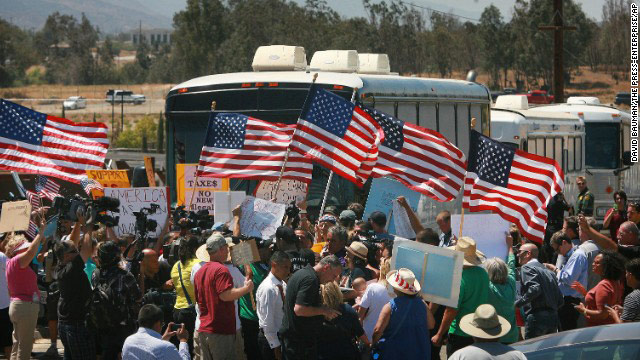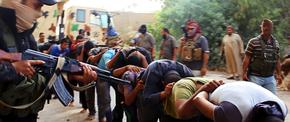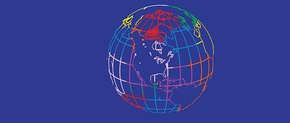The views expressed in our content reflect individual perspectives and do not represent the authoritative views of the Baha'i Faith.
Nationalism can sure turn ugly.
Yesterday I watched news footage of three American government buses filled with refugee children, all being verbally attacked by a horde of jingoistic, flag-waving demonstrators in Murrieta, California. Angry screaming adults, shouting patriotic slogans mixed with obscenities, blocked the road and stopped the buses, demanding that the children be sent back to their “own countries.”
These refugee children, fleeing from failing, crime-ridden Central American states like Honduras, Guatemala and El Salvador, had come to America to reunite with one or both parents.
One protestor’s sign said “Down with Illeagle Immigrants!” I have no idea what she had against sick eagles.
Another sign said “Protect Our American Children from Disease!” I saw that one as a new racist low, even among grown men and women who viciously yell epithets at frightened children.
Why do people automatically hate those from other places? I felt like an ill eagle myself, watching all that spitting and spewing of venom and prejudice and hatred. Why does it seem so hard for some folks to see the common humanity in everyone? This kind of demonizing of little children from another country absolutely baffles me.
But then the following news story heartened me, and made me feel much better. At the next place the buses went, they had heard about the ugly protests, and a whole host of welcoming, loving signs came out. People held up quickly-drawn placards that said “You’re welcome here” and “We love you.”
Had I been there I would’ve held up a sign with my favorite phrase from the Baha’i teachings: “The earth is but one country, and mankind its citizens.”
The sick, jingoistic, nativist, racist hatred those news reports showed, the Baha’i writings say, forms the major barrier to a more equitable and peaceful world:
The body politic today is greatly in need of a physician. It is similar to a human body afflicted with severe ailments. A doctor diagnoses the case and prescribes treatment. He does not prescribe, however, until he has made the diagnosis. The disease which afflicts the body politic is lack of love and absence of altruism. In the hearts of men no real love is found, and the condition is such that, unless their susceptibilities are quickened by some power so that unity, love and accord may develop within them, there can be no healing, no agreement among mankind. Love and unity are the needs of the body politic today. Without these there can be no progress or prosperity attained. Therefore, the friends of God must adhere to the power which will create this love and unity in the hearts of the sons of men. Science cannot cure the illness of the body politic. Science cannot create amity and fellowship in human hearts. Neither can patriotism nor racial allegiance effect a remedy. It must be accomplished solely through the divine bounties and spiritual bestowals which have descended from God in this day for that purpose. This is an exigency of the times, and the divine remedy has been provided. The spiritual teachings of the religion of God can alone create this love, unity and accord in human hearts. – Abdu’l-Baha, The Promulgation of Universal Peace, p. 171.
God has not left us alone, the Baha’i writings assure us. Baha’u’llah’s revelation addresses the need for a divine physician, a spiritual healer for the world’s divisions and disunity, a global force for love, equality and inclusion:
In this present age the world of humanity is afflicted with severe sicknesses and grave disorders which threaten death. Therefore, Baha’u’llah has appeared. He is the real Physician, bringing divine remedy and healing to the world of man. He has brought teachings for all ailments…. These Holy Words and teachings are the remedy for the body politic, the divine prescription and real cure for the disorders which afflict the world. Therefore, we must accept and partake of this healing remedy in order that complete recovery may be assured. – Abdu’l-Baha, The Promulgation of Universal Peace, p. 204.


















Comments
Sign in or create an account
Continue with Facebookor